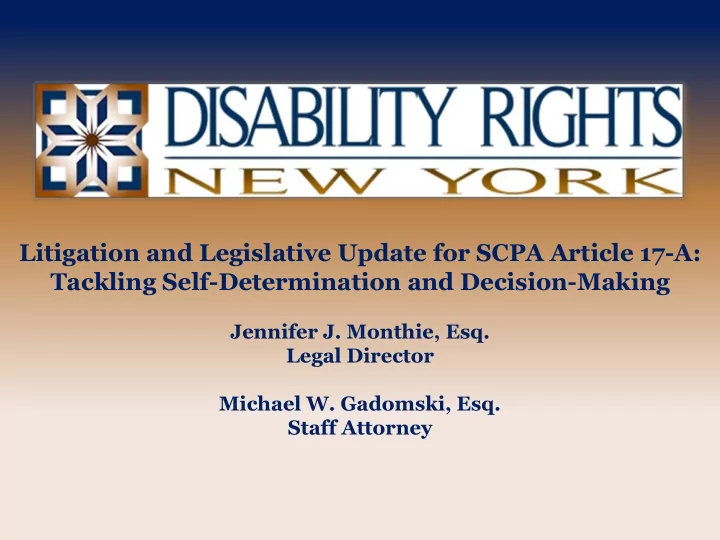

Litigation and Legislative Update for SCPA Article 17-A: Tackling Self-Determination and Decision-Making Jennifer J. Monthie, Esq. Legal Director Michael W. Gadomski, Esq. Staff Attorney
Introduction Disability Rights New York is the statewide Protection and Advocacy System and Client Assistance Program DRNY advocates for New Yorkers with disabilities to enable them to: • Exercise their own life choices • Fully participate in their communities • Enforce their civil and legal rights
Surrogate’s Court NY Surrogate’s Courts are primarily responsible for settling estates either through a will or intestacy. Surrogate’s Court also have jurisdiction over guardianships of minors and people with intellectual or developmental disabilities.
SCPA Article 17-A Article 17- A of the Surrogate’s Court Procedure Act (“SCPA”) gives a Surrogate’s Court the ability to appoint a guardian for a person with an intellectual disability or a developmental disability.
SCPA Article 17-A A petition for a 17-A guardianship requires two certifications (by either two physicians or a psychologist and a physician) affirming: ▪ (1) a proposed ward is incapable of managing his or her affairs by reason of their intellectual or developmental disability; ▪ (2) Such condition is permanent in nature or likely to continue indefinitely.
Types of Guardianship • A 17-A guardianship can be plenary or limited to a guardian of the property. • A plenary guardianship means the guardian is responsible for both the personal care and the property of the ward. • Personal care includes decisions about where to live, where to travel, selection of disability- related services, and whom to socialize with. • Property includes handling the ward’s finances, benefits, and real property.
ADA and Title II • Title II of the ADA prohibits public entities from discriminating against people with disabilities on the basis of their disabilities. • The Supreme Court in Olmstead v. L.C., 527 U.S. 581 (1999), determined that unjustified segregation of people with disabilities is discrimination. • Therefore, government agencies must provide services in the most integrated setting appropriate unless doing so would fundamentally alter the governmental service.
Olmstead Plan • In order to assert a fundamental alteration defense governmental agencies must have an Olmstead Plan. • This Plan is the public entity’s strategy for implementing its obligation to provide individuals with disabilities opportunities to live, work, and be served in community integrated settings.
New York’s Olmstead Plan • New York State created an Olmstead Plan in October 2013 and the plan called for reforming Article 17- A of the Surrogate’s Court Procedure Act. • The State’s rationale for reform: • Article 17-A does not adequately consider the functional capacity of a proposed ward; • A hearing is not required; • If there is a hearing, the presence of the proposed ward is not required; • Guardianship is not tailored to the person’s specific deficits; and • The guardian is not required to consider the ward’s preferences in making decisions.
Elements of Article 17-A Under Review Necessity of Guardianship Standard of Proof Notice Petition Right to Counsel Hearing Plenary v. Tailored Guardianship Reporting and Review Powers and Selection of Guardian Modification/Termination/Restoration of Rights Decision-Making Standard
Legislative Reform of Article 17A In 2015, the Office for People With Developmental Disabilities (“OPWDD”) proposed a departmental bill to the Legislature which sought to redress the discrimination criticized in the Olmstead report. The bill was not enacted. On February 16, 2017 , New York Assembly member Charles D. Lavine introduced A5840 to amend Article 17- A. The bill was referred to the Assembly’s Judiciary Committee and no further legislative action has taken place. Meanwhile, the New York State Senate passed their version of the 17-A reform bill on June 21, 2017 .
DRNY v. New York State On September 21, 2016, DRNY filed suit in the United States District Court for the Southern District of New York seeking to enjoin the State of New York from appointing guardianships pursuant to Article 17-A. The lawsuit claims that Article 17-A violates the Fifth and Fourteenth Amendments of the United States Constitution, the Americans with Disabilities Act (ADA), and Section 504 of the Rehabilitation Act of 1973 (Section 504). August 2017 Decision and Status
Individual Representation DRNY represents persons with intellectual or developmental disabilities who are subject to 17-A proceedings or wish to remove their 17- A guardianship.
IN RE B.M., 19 N.Y.S.3D 393 (RENSSELAER SURR. CT. 2015) ▪ DRNY represented a 19 year old male with ID/DD who was opposed to his parent’s petition for guardianship. ▪ DRNY moved to dismiss the case and strike the certification forms from the petition because certifications relied on information that was subject to our client’s physician -patient privilege. ▪ The Surrogate’s Court granted DRNY’s motion to strike and the doctor affidavits were removed from the petition. ▪ Subsequently the case settled with our client continuing to be his own guardian.
IN RE J.R. (UNREPORTED CASE) ▪ DRNY represented a 30 year old male with a mild intellectual disability. ▪ DRNY filed a petition to terminate our client’s 17 -A guardianship on the basis it was unnecessary and did not serve his best interests. ▪ After holding a hearing, the Surrogate’s Court granted an order terminating the guardianship and restoring our client’s legal capacity.
Supported Decision- Making (“SDM”) Pilot • In 2016, the NYS Developmental Disabilities Planning Council launched a Supported Decision-Making pilot program • The pilot program seeks to: • develop an educational campaign about SDM; • create a model for SDM; and • formalize SDM agreements between PWDs and their family or primary caregivers.
Contact Information DISABILITY RIGHTS NEW YORK 725 Broadway, Suite 450 Albany, NY 12203 Phone (518) 432-7861 Toll Free: (800) 993-8982 TTY: (518) 512-3448 Fax: (518) 427-6561 Email: mail@DisabilityRightsNY.org www.DisabilityRightsNY.org
Recommend
More recommend